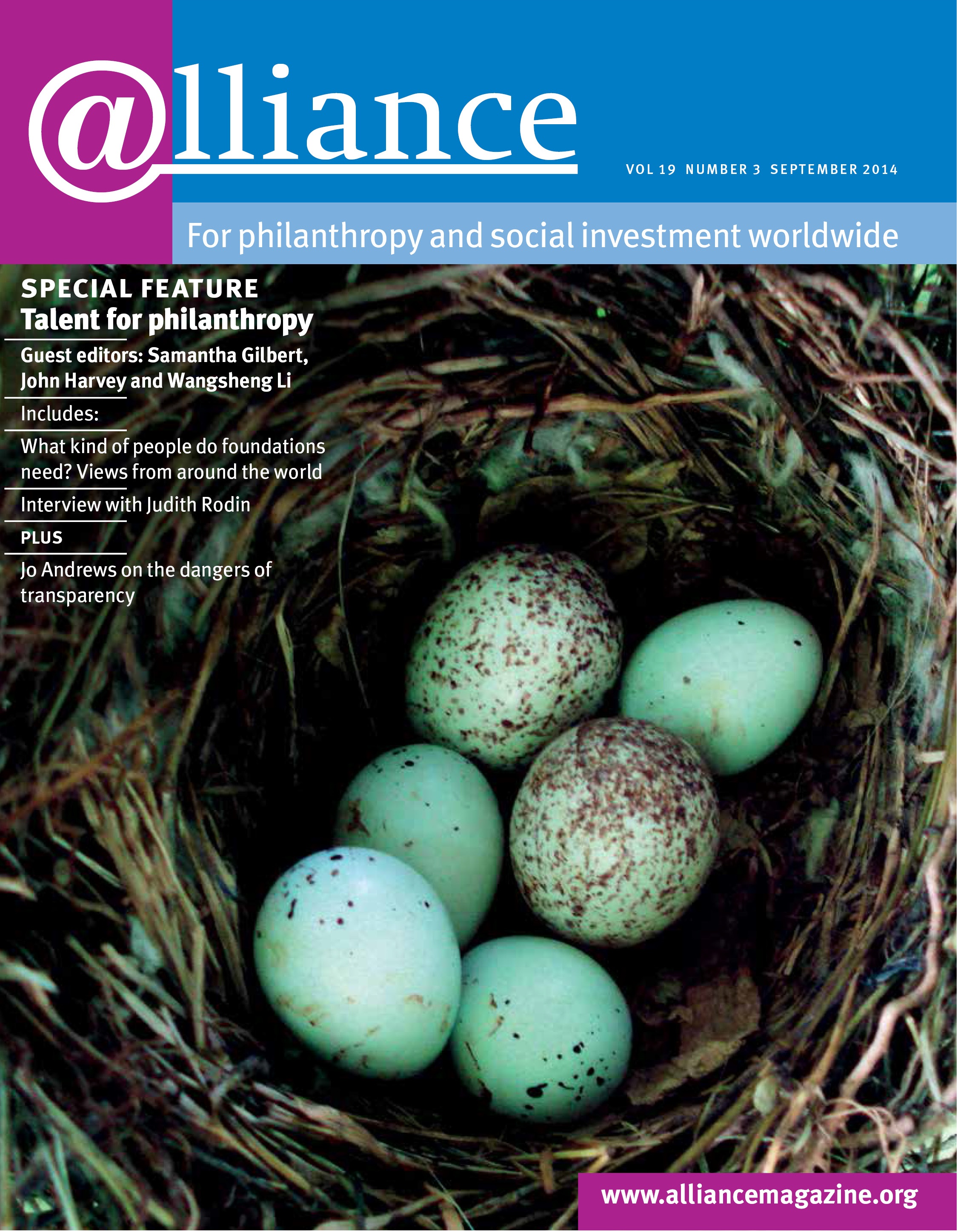Scaling solutions, building resilience, catalysing innovation: these are the philanthropy sector’s buzzwords du jour. There’s nothing inherently wrong with these goals – except that the current programme officer position isn’t set up to deliver them. If you want to have social impact, stop thinking of this role as managing a set of grants and instead consider what it means to be a network manager.
Meet Sophia, a typical programme officer at a mid-sized foundation. She pursued her PhD in early childhood development in order to promote girls’ education in developing countries, and joined the foundation eight years ago in response to a job description that emphasized sector expertise. Her primary responsibility has been making 6- to 12-month grants, and as such she’s perpetually looking for new ideas to fund. Money has been her tool and her grantees’ reports have been her evidence of impact. She travels to the field sporadically to meet new organizations. She’s never brought her grantees together, although she notices overlaps in their work. Sophia admits that she’s not seeing the systemic impact she hoped for. Instead she sees small advances by individual grantees. And she’s finding it harder and harder to keep up with the pace of change in the sector. Reports and articles on her desk are mounting and her inbox has become unmanageable.
Sound familiar? If you recognize yourself in this description, pay attention: the role of the programme officer as you know it is over. Much of philanthropy still operates in siloes even though it is widely recognized that most of the world’s problems are systemic in nature. What’s more, most solutions to those systemic issues require shifts in behaviour, values and/or culture, which cannot be accomplished in isolation
Ziba Cranmer at Hunt Alternatives
Sophia could learn a few things from Ziba Cranmer at Hunt Alternatives in Cambridge, Massachusetts. Instead of viewing her role as a funder, Ziba sees herself as a network catalyst, using funding as a precision tool to spur new collaborations. In her work to combat sex trafficking, Ziba has realized that the problem persists because of a complicated web, whose unravelling will require significant changes on the part of many actors.
Starting with four US pilot cities and adding more this August, Ziba and Hunt Alternatives are building local networks of individuals, coalitions and organizations to address the demand side of the sex trade. Because Hunt Alternatives knows that solving the problem requires changing the human systems creating the culture, grantmaking alone isn’t going to create a lasting solution. Instead, Ziba is focused on constructing a network that facilitates peer-to-peer connections and rewards community members for doing their work collaboratively. Ziba is knitting together complementary organizations (mayors’ offices, police taskforces, local philanthropists, etc) in order to reduce the demand for commercial sex. Ziba is now getting calls from other cities asking how to catalyse similar networks.
Programme officers of the future should be connecting relevant actors in an ecosystem and facilitating their collaboration, recognizing that money isn’t foundations’ chief tool.
Andrea Silvestri at Fondazione CRC
Observing Fondazione CRC (Cassa di Risparmio di Cuneo) programme officer Andrea Silvestri in Cuneo, Italy, would help Sophia learn to notice patterns and use her foundation’s convening power to connect the dots among relevant organizations.
Several years ago during Europe’s worst economic crisis in decades, Andrea noticed more and more organizations working to anticipate family homelessness by identifying and supporting families who were on the verge of being evicted. However, these diverse organizations addressed the issue from different angles. They were all under-resourced and had incomplete approaches to finding families in need.
Seeing this, Andrea used his foundation’s convening power to promote the EmergenzaCasa (‘housing emergency’) initiative, and to form local working groups spread around Cuneo province (half a million people), involving the municipality, the local Catholic church and representatives of the public agency for social services. This multi-sector group used their respective information and perspectives, each within their own small community, to determine which families needed economic support to avoid being forced out of their homes. They worked with property owners to reach new rental agreements – and then to distribute emergency funds provided by the foundation. By working together, they were better able to target their limited resources to the families most in need, and negotiate more effectively with landlords. They also tapped into their respective networks to assist families with related issues such as unemployment.
Rather than trying to pick the ‘best’ organization to fund with an individual grant, Andrea has built a cross-functional network. The foundation is putting €700,000 to €800,000 per year into this collaboration, and has helped more than 680 families.
Brian Kearney-Grieve at the Atlantic Philanthropies
Grant managers becoming network managers face another challenge: addressing the ‘right’ social problems at their inception point. Because Sophia is having difficulty keeping pace with change in her issue areas, it’s impossible for her to know whether she is focused on the core of an issue where the highest potential for impact lies.
Brian Kearney-Grieve sees the building and maintaining of networks as central to his effectiveness. For each of his topic areas (disabilities, migration, human rights, LBGT issues), he has actively built local networks with ‘at least as many non-grantees as grantees’, he says. At times, Brian specifically asks people to play the role of the ‘contrarian’ who will challenge his networks to think differently. To reward them, he recognizes them publicly, provides information and data, and recommends them for board positions. In addition, he acts as an information curator, spending at least 10 per cent of every day disseminating information to his networks, connecting local organizations to pan-European information.
Brian has created an intelligence network with communication channels that allow him to stay abreast of new developments in his issue areas. The organizations in his network benefit, too, as they are connected to a near-constant source of up-to-date information.
Atlantic’s funding strategy reinforces Brian’s approach. Because his grantees receive multi-year core funding, they regularly interact with non-grantees in his intelligence networks. There’s open dialogue without fear of losing funding, which allows grantees and the foundation to act more strategically.
Getting started
Making the shift to managing networks, not just grants, is easier than you think. Here are some suggestions.
Being a connector before being a funder
- Try setting a repeating appointment dedicated to connecting people to each other and to information. Aim to have at least 75 per cent of your interactions with organizations that you don’t fund.
- Ask your grantees to draw a picture of their networks and then plan a dinner, meet-up or Google hangout with some of them.
- Focus on seeing trends and patterns – and convene organizations around these themes.
- To really spark your network, try doing this in partnership with another programme officer who focuses on a complementary issue.
Building intelligence networks
- Try using crowdsourcing tools like transparent online prize competitions, LinkedIn groups and Twitter-chats to allow members of your network to find each other. This knitting together of your network will allow new ideas to surface and new collaborations to form.
- If you start small, with a community of practice focused on a geographical region or a topic area, you’ll be on your way to being more networked. Be open to your intelligence networks including people you’ve never engaged with, as well as contrarians who will challenge you.
- Consider the value for the organizations of being part of your network and communicate it clearly and regularly; don’t just assume that people will want to interact with you.
- Do it now. The sooner you begin to connect the members of your network to each other, the sooner ideas will begin to emerge.
If you’re serious about this, you will need to recruit colleagues with network management skills. Their job description should include words like facilitator, curator and communicator. Rather than searching for subject experts, look for the generalists with a knack for seeing patterns, a passion for connecting people and ideas, and an insatiable curiosity about what’s possible.
The role of programme officers is changing. If you become a leader in shifting from managing grants to managing your network, you can help communities achieve the systemic impact you dream of.
Kimberly Manno Reott is managing director – Brussels of Context Partners, a social innovation design firm. Email kimberly@contextpartners.com




Comments (1)
The article resonates swell with my own experience and those with whom I have been working with during the last decade as a consultant facilitator/mentor for two regional projects (one with the U.N. Industrial Development Organisation in creative multimedia enterprises and another, with the ERSTE Foundation Roma Partnership to promote community-driven social businesses) where we focused on developing intra-regional partnerships that were interested in building, sharing and bridging resources based on common interests, problems and visions. My experience also bears out that grant management demands a lot of work but frustrating for both stakeholders and intended beneficiaries compared with what I call managing partnerships-for- development.